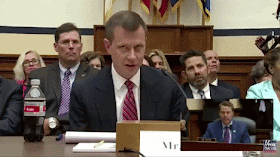Petr Svab reporting for The Epoch Times
The FBI stated that one of its former high-level officials, Peter Strzok, lapsed in his duties by failing to investigate evidence in the Clinton investigation found on the laptop of former Rep. Anthony Weiner, according to a document released in a recent court filing.
“[Your] lack of a proper oversight and diligent follow through created an enormous embarrassment to the Bureau and has been cited by many as having altered the results of a presidential election,” said Jessica Loreto of the FBI’s Office of Professional Responsibility (OPR) in a June 15, 2018, letter to Strzok (pdf).
In the 23-page letter, Loreto proposed firing Strzok for investigative deficiency as well as unrelated unprofessional conduct off-duty and a security violation.
The Department of Justice (DOJ) filed the letter with Washington federal court on Nov. 19 in response to Strzok’s lawsuit against his dismissal.
Strzok, formerly the FBI’s deputy assistant director in the Counterintelligence Division, led the investigation into Hillary Clinton’s use of private email server during her tenure as secretary of state. He was also one of the key players in the investigation into several associates of then-candidate Donald Trump for alleged ties to Russia.
The FBI closed the Clinton probe in July 2016. Then-FBI Director James Comey announced Clinton was “extremely careless” in handling classified information, but recommended no charges against her.
In September 2016, FBI agents in the New York field office obtained Weiner’s laptop in an investigation of his sexual exploitation of a minor.
On Sept. 28 and Sept. 29, 2016, the field office communicated to multiple officials responsible for the Clinton investigation that hundreds of thousands of Clinton’s emails have been found on the laptop going back to 2007 and including BlackBerry messages, which suggested there were communications from three months early on in Clinton’s tenure that the FBI wasn’t able to recover from other sources.
Yet Strzok apparently didn’t touch the lead for weeks and only pursued the new warrant nearly a month later after a distressed agent from the field office alerted his supervisors, who then informed the DOJ.
“The crickets I was hearing was really making me uncomfortable because something was going to come crashing down,” the agent later told the DOJ’s Office of the Inspector General.
‘Unpersuasive’
Strzok acknowledged the lead carried weight because Weiner was married to Clinton’s longtime aide, Huma Abedin.
He said, however, that the Russia investigation was more urgent; that the Clinton probe team waited for the field office to provide more information; and that the team wasn’t given enough specific information about what was on the laptop and how significant it was, Loreto’s letter summarized.
Strzok also said the team couldn’t get the information from the laptop because the field office had a search warrant that only authorized search for materials related to the Weiner investigation.
Loreto found the arguments “unpersuasive.”
She pointed out that the field office already made sufficiently clear how significant the find was as well as the need for an additional search warrant.
“The investigation reveals that there is no reasonable excuse for the FBI’s delay in following up on this matter,” she stated.
After the FBI finally obtained the warrant and searched the laptop, then-FBI Director James Comey decided it was so significant that he needed to inform Congress that his previous testimony that the Clinton probe was over needed to be corrected.
The information quickly seeped into the media, casting a cloud over Clinton’s candidacy not two weeks before election day. Two days before the election, Comey told Congress the FBI still didn’t recommend charging Clinton.
An extensive report by RealClearInvestigations later revealed that only a fraction of the emails on the laptop were actually reviewed. The new search warrant was so narrow it didn’t even include the BlackBerry messages, which the FBI had previously described as the “golden emails” the agents couldn’t find anywhere else.
The report concluded that it’s possible the laptop has since been returned to Weiner and Abedin.
“Wherever its location, somewhere out there is a treasure trove of evidence involving potentially serious federal crimes—including espionage, foreign influence-peddling, and obstruction of justice—that has never been properly or fully examined by law enforcement authorities,” the report stated.
Biased Texts
The primary reason cited for Strzok’s firing were text messages he exchanged in 2016 and 2017 with former FBI lawyer Lisa Page, with whom he was having an affair and who was at the time special counsel to FBI’s then-Deputy Director Andrew McCabe.
In the texts, both officials expressed a strong animus against Trump and a preference for Clinton.
Strzok claimed in his lawsuit his dismissal infringed on his First Amendment rights and that it was motivated by Trump’s antipathy toward him.
But the DOJ disagreed, saying his position “imposed on him a higher burden of caution with respect to his speech.”
“It is because of those text messages, and the paramount importance of preserving the FBI’s ability to function as a trusted, nonpartisan institution, that Plaintiff was removed from his position, and not because of any alleged disagreement with Plaintiff’s viewpoints on political issues or Tweets from the President,” DOJ lawyers stated in a Nov. 18 court filing (pdf).

